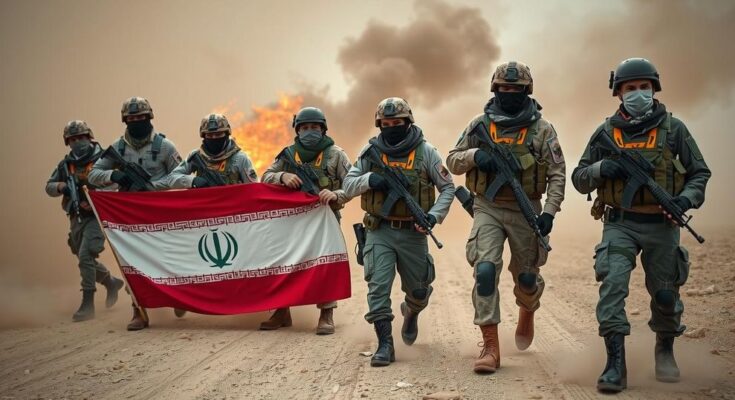The Iraqi Popular Mobilization Units reaffirm their allegiance to Iran, as expressed by leader Faleh Al-Fayyad, amidst changing political dynamics in Syria. The PMU’s loyalty to Iranian influences remains strong, while discussions about the potential impact of new Syrian leadership on Iraqi politics ensue. Iraqi stakeholders, including Sunni and Kurdish leaders, are closely observing these shifts.
Recent reports confirm that the Iraqi Popular Mobilization Units (PMU), a coalition of paramilitary groups, continue to express their allegiance to Iran, as articulated by Faleh Al-Fayyad, the leader of the PMU. This statement, made during a commemorative meeting in Diyala, Iraq, referenced their devotion to their Iranian counterparts, particularly to the late Lieutenant General Qassem Soleimani, whose efforts were pivotal in combating the Islamic State (ISIS). As Iraqi militias shift their focus from Israel to concerns in Syria, they have recently engaged with Syrian leadership, indicating a potential change in regional dynamics.
The gathering, held to mark the defeat of ISIS in December 2014, included discussions on the ramifications of shifting power dynamics within neighboring Syria. Al-Fayyad reiterated the PMU’s loyalty to Iranian affiliations, particularly highlighting figures like Soleimani and Abu Madhi al-Muhandis, both of whom perished in a U.S. drone strike in January 2020. These developments indicate a strategic pivot for Iranian-backed militias as they reassess their stance towards conflict and cooperation within and beyond Iraq.
In parallel, Hadi al-Amiri, head of the Badr Organization—a critical faction within the PMU—declared their confidence in the new Syrian administration, yet expressed apprehensions over its potential influence on Iraqi politics. The implications of recent leadership shifts in Syria are being closely monitored by various stakeholders, including Sunni leaders in Iraq who hope for favorable conditions for their communities. Furthermore, leaders from the Kurdish Democratic Party (KDP) in northern Iraq are observing these political changes, potentially seeking to forge inclusive governance in the region as circumstances evolve.
The Iraq-Iran relationship has been bolstered through various paramilitary organizations primarily composed of Shia militias, known as the Popular Mobilization Units (PMU). Formed in response to ISIS’s invasion of Iraq in 2014, these groups received significant support from Iran. Following the assassination of influential Iranian leaders like Qassem Soleimani, there is ongoing speculation about their allegiance and the extent to which these militias will adapt to new geopolitical landscapes, particularly regarding regional neighbors like Syria. As Iraq grapples with its regional identity, military affiliations and political maneuvers will shape its future as well as its relationships with Iran and nearby countries.
In summary, the Iraqi Popular Mobilization Units reaffirm their allegiance to Iran while navigating a changing political landscape exemplified by shifts in Syria. As concerns arise regarding the influence of new Syrian leadership on Iraq, both Sunni and Kurdish leaders monitor these developments closely. The interplay of loyalties, regional politics, and historical alliances will significantly impact the stability and governance of Iraq in the coming months.
Original Source: www.jpost.com




